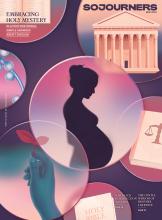“Wisdom speaks her own praises, in the midst of her people she glories in herself.” What a luscious, full-bodied image from the biblical book of Sirach (24:1). Wisdom has sass! In an increasingly combative society, I’m drawn to Sirach’s prudence, poetic excess, and the authoritative agency of Lady Wisdom.
I’ve been keeping phrases from Sirach, also known as Ecclesiasticus, in mind as post-Roe legislation rolls across the states. The health of women and children (born and unborn) has been weakened, rather than strengthened. Political and social platforms ring out with dangerous nonsense about making criminal statutes apply at the time of fertilization, allowing the death penalty for abortion, or, conversely, promoting violence against “pregnancy crisis centers.”
How do we stop the howl when we feel urgently that lives are on the line? Sirach, which is part of the Catholic canon, says, “The fear of God is an abundant garden; its canopy higher than all other glory” (40:27). “Fear” means “body-trembling awe” before our Creator. Amid so much that I don’t understand and don’t know what to do about, this strange scriptural juxtaposition feels like Lady Wisdom speaking to our present condition.
Read the Full Article

